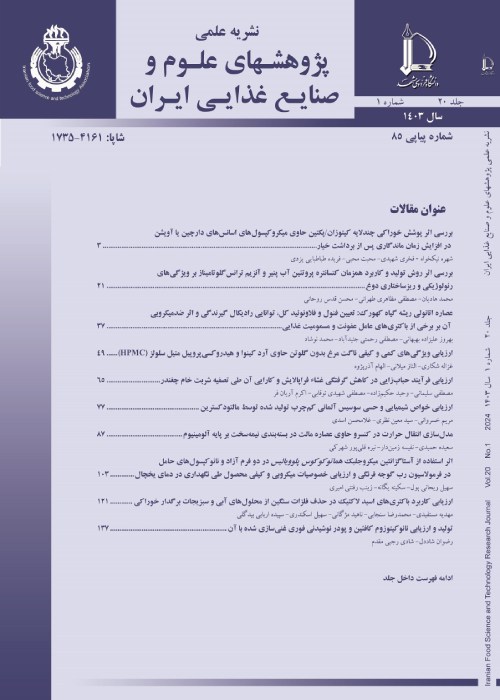In vitro evaluation of anti-mold activity of annatto natural dye
Author(s):
Article Type:
Research/Original Article (دارای رتبه معتبر)
Abstract:
Introduction
Nowadays, with the increasing awareness of the side effects of synthetic additives, consumers demand for colorants from natural sources has been increased. Annatto is an allowed natural colorant used in food industries, textiles, cosmetics and pharmaceutical products. The colorant is extracted from the seeds, which are covered by a red, resinous pericarp containing the pigments. The main pigment is bixin (methyl hydrogen 9′-cis-6, 6′-diapocarotene-6, 6′-dioate) which is responsible for the orange red color in the seeds (80% of total carotenoids). Smaller amounts of norbixin are also presented. Bioactive compounds like bixin and phenolic compounds reduce the risks of various chronic disorders, such as cancer, inflammation, cardiovascular, hypercholesterolemia, diabetes, and cataracts (Boschetto, et al., 2014; Somacal et al., 2015; Ezuruike & Prieto, 2014). Moreover many studies have proven antimicrobial activity of annatto extracts (leaves, capsules, seeds
) against several food spoilage and pathogenic bacteria such as Staphylococcus aureus, Escherichia coli and Bacillus subtilis, as well as few fungi such as Candida utilis, and Aspergillus niger. Annatto is a permitted natural food coloring with antioxidant properties, high therapeutic potential and antimicrobial effects. The aim of this study was to evaluate antimold activity of annatto natural dye on 3 important food pathogenic and spoilage molds, Aspergillus niger,Neurospora sitophila and Rhizopus stolonifer.Material and
Methods
Annatto dye was extracted by maceration method and after filtration it was dried by a vacuum oven. Anti-mold activity was evaluated by well diffusion and disk diffusion methods in 1 to 10 percent concentrations of acetone extract of annatto and minimum inhibitory concentration (MIC) was determined using agar dilution method at 48 and 72 h after incubation at 25 °C.Results And Discussion
The results indicated promising anti-mold activity. The highest mean zones of inhibition in all concentrations were obtained for Aspergillus niger, Neurospora sitophila and Rhizopus stolonifer, respectively. This difference might be due to the more resistance and rapid growth of Rhizopus stolonifer and Neurospora sitophila compared to Aspergillus niger. No inhibitory effect was observed in the concentrations below than 1%, this result is in consistent with Irobi, et al., (1996) findings that proved annatto's organic extract has a weak effect on Aspergillus niger at low concentration (5 mg/ml).In all concentrations, Aspergillus niger showed the highest inhibition zone and the most sensitivity to annatto extract found at Aspergillus niger, Neurospora sitophila and Rhizopus stolonifer, respectively. Disk diffusion method was inefficient to inhibit mold growth. Minimum inhibitory concentration of annatto dye against Aspergillus niger and Neurospora sitophila was determined 6 percent while Rhizopus stolonifer showed 7 percent. According to the results annatto dye was effective to inhibit growth of Aspergillus niger, Neurospora sitophila and Rhizopus stolonifer. Therefore it can be concluded that annatto dye could be used as a functional and inhibitory agent against mold growth in the foods that are susceptible to mold spoilage (e.g. bakery goods).Keywords:
Language:
Persian
Published:
Iranian Food Science and Technology Research Journal, Volume:14 Issue: 4, 2018
Pages:
533 to 541
magiran.com/p1839987
دانلود و مطالعه متن این مقاله با یکی از روشهای زیر امکان پذیر است:
اشتراک شخصی
با عضویت و پرداخت آنلاین حق اشتراک یکساله به مبلغ 1,390,000ريال میتوانید 70 عنوان مطلب دانلود کنید!
اشتراک سازمانی
به کتابخانه دانشگاه یا محل کار خود پیشنهاد کنید تا اشتراک سازمانی این پایگاه را برای دسترسی نامحدود همه کاربران به متن مطالب تهیه نمایند!
توجه!
- حق عضویت دریافتی صرف حمایت از نشریات عضو و نگهداری، تکمیل و توسعه مگیران میشود.
- پرداخت حق اشتراک و دانلود مقالات اجازه بازنشر آن در سایر رسانههای چاپی و دیجیتال را به کاربر نمیدهد.
In order to view content subscription is required
Personal subscription
Subscribe magiran.com for 70 € euros via PayPal and download 70 articles during a year.
Organization subscription
Please contact us to subscribe your university or library for unlimited access!


